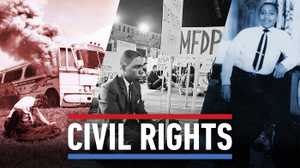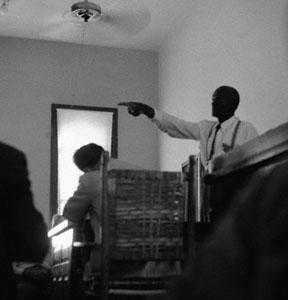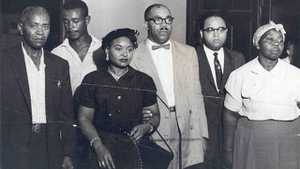Emmett Till's Legacy
A professor of History and Africana Studies reflects on Emmett Till's legacy.
Read these excerpts from an interview with Robin D. G. Kelley, professor of History and Africana Studies and chair of the history department at New York University, on the legacies of Emmett Till's murder.
The Emmett Till case was a spark for a new generation to commit their lives to social change, you know. They said, "We're not gonna die like this. Instead, we're gonna live and transform the South so people won't have to die like this." And if anything, if any event of the 1950s inspired young people to be committed to that kind of change, it was the lynching of Emmett Till.
Emmett Till, in some ways, gave ordinary black people in a place like Montgomery not just courage, but I think instilled them with a sense of anger, and that anger at white supremacy, and not just white supremacy, but the decision of the court to exonerate these men from murdering -- for outright lynching this young kid—that level of anger, I think, led a lot of people to commit themselves to the movement. And Montgomery felt the reverberations of that just like Little Rock, Arkansas, two years later.
And I think that that anger was somehow transformed into social movement and, ironically, into love. And what I mean by that is into love for the people who they're trying to defend and love for a nation that had for so long oppressed them, but they felt was transformable. They felt that as black people involved in the movement, that Emmett Till's body was sacrificed in some ways, that George Lee's body was sacrificed, that many of the activists who were murdered were sacrificed for the sake of saving the country, redeeming this nation. And I think that's why, you think of something like the non-violence philosophy of the Civil Rights movement as directly related to the violence meted out on people like Emmett Till.
Mamie Till Bradley's decision to have an open-casket funeral was incredibly courageous and, in fact, it was the thing that was—even more than his murder -- an emotional catalyst for many people who were drawn to this incident, largely because she made the decision to allow the world to see what these white supremacists did to her son, and it became an international event, and that image of his face was marked on just about every single black person, of that generation, let alone people in Europe and Africa and Asia who saw the same images. I know for me personally, when I first saw those images, years later, it was shocking to me. It was one of those unforgettable images that I think that every generation, years afterwards, will never forget.
For Mississippi to legitimize itself, it had to have a trial. It had to at least show a front of justice. Otherwise, it could be easily dismissed by the federal government—and all of its claims for the right to be autonomous, to have state's rights, to take care of its own affairs, would have been null and void.
The other thing is that in the age of the Cold War, states like Mississippi and Alabama were looked upon by the world. The United States had a foreign policy of proving that democracy exists at home, proving that it doesn't have a race problem or a colonial problem. And it became more and more difficult for the State Department to do its work outside of the United States when back home you have all this racism and violence.
And so there was pressure on Mississippi from the State Department, pressure on Mississippi from the federal government, pressure on Mississippi congressmen, senators and the governor to look legitimate. So they tried to strike this balance between legality and legitimacy, on the one hand, and the same old white supremacy and violence, on the other. And so the trial was somewhat of a show, though everyone knew what the outcome would be—and that is, "not guilty."
We often think of Emmett Till as a case of a young man being murdered, but we don't always pay attention to what it meant for a young woman and young mother to stand up and really commit her life to activism, to social change. The courage that [Till's mother] exhibited, I think, was a role model for many of the women who were drawn to the civil rights movement. You know, we often talk about Fannie Lou Hamer or we talk about Ella Baker. We don't always talk about Mamie Till Bradley as one of those heroines who stood up at a time when not many women were being called forth in the struggle to that degree.
I think there are at least two distinct legacies of Emmett Till. One, that the level of violence that was commonplace in a place like Mississippi became known to the world, and that violence generated anger and outrage—and in some ways courage -- for those fighting in Mississippi and those willing to come South to fight that fight.
I think the second legacy of Emmett Till is that Jim Crow racism, as it used to exist from the age of slavery, could no longer exist. Now something has to change. And black people in Mississippi itself were the ones who were going to make that change. And the great thing is that the change that they made, the extension of citizenship to all people, is a change that affected all of America, not just black people, but whites, Latinos, Asian Americans. It extended democracy to the country when democracy had never been extended to everyone before.

A new AMERICAN EXPERIENCE collection, currently featuring a selection of our award-winning films from Stanley Nelson (Firelight), documenting pivotal moments in the 20th century civil rights movement— along with articles, digital shorts and original features exploring America’s continued struggle with race, democracy and justice.







